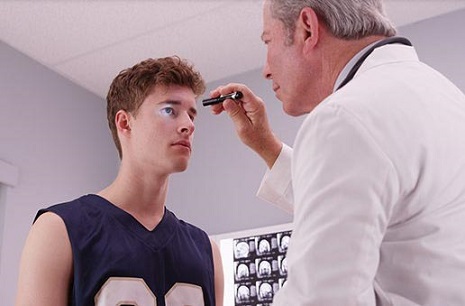Nikhil Prasad Fact checked by:Thailand Medical News Team Jul 19, 2024 9 months, 1 week, 17 hours, 45 minutes ago
COVID-19 News: In an era marked by the COVID-19 pandemic, the world of sports medicine faces new challenges. Recent research sheds light on a fascinating yet complex overlap between Post-COVID-19 Neurological Syndrome (PCNS) and Post-Concussion Syndrome (PCS) in athletes. This
COVID-19 News dives into the key findings and implications of this study, exploring how these conditions intersect and what it means for athletes' health.
 COVID-19 and concussion - overlapping symptoms in athletes
The Study and Key Contributors
COVID-19 and concussion - overlapping symptoms in athletes
The Study and Key Contributors
Researchers from various institutions have collaborated to explore these overlaps. The team includes experts from Leeds Teaching Hospitals NHS Trust and Leeds University in the UK, Aristotle University of Thessaloniki in Greece, and several universities in Romania and Morocco. Their collective effort provides a comprehensive understanding of how COVID-19 and concussion impact neurological health.
Symptom Overlaps: A Complex Clinical Picture
Both PCNS and PCS present with a range of symptoms that often overlap. Cognitive difficulties, such as brain fog and memory issues, are common in both conditions. Athletes recovering from COVID-19 and those suffering from concussions frequently report headaches, dizziness, fatigue, and sleep disturbances.
One standout symptom unique to COVID-19 is anosmia (loss of smell) and ageusia (loss of taste). These symptoms provide a distinctive marker for PCNS, differentiating it from PCS. However, the general overlap in symptoms poses diagnostic challenges and complicates treatment strategies.
Pathophysiology: Similar Yet Different
Understanding the pathophysiology, or the functional changes that accompany these diseases, is crucial. Both conditions disrupt the blood-brain barrier (BBB), a critical defense mechanism that protects the brain from harmful substances in the blood. In COVID-19, this disruption is mainly due to systemic inflammation caused by the virus. Conversely, in concussions, the disruption results from the mechanical forces exerted during the injury.
Managing the Dual Challenge
Given the overlapping symptoms, managing athletes who suffer from both conditions requires a nuanced approach. Treatment protocols must be tailored to address both the shared and unique aspects of PCNS and PCS. This includes cognitive rehabilitation, physical therapy, and psychological support.
Cognitive Rehabilitation and Physical Therapy
Cognitive rehabilitation is essential for athletes dealing with brain fog and memory issues. Techniques such as cognitive behavioral therapy can help improve mental functions and manage mood disturbances. Physical therapy, particularly progressive aerobic exercises and resistance training, is vital to restore physical health and endurance without exacerbating symptoms.
Psychological Support
Mental health support is equally
crucial. Athletes often face heightened anxiety and depression during prolonged recovery periods. Providing robust psychological support can help manage these issues, ensuring a holistic recovery process.
Implications for Athletes
Athletes recovering from COVID-19 and concussions face significant challenges. Exercise intolerance, cognitive difficulties, and mental health issues can severely impact their performance and quality of life. A tailored, interdisciplinary approach involving neurology, psychiatry, physical therapy, and sports medicine is necessary to ensure comprehensive care.
Research Highlights
Key findings from the study include:
-Symptom Overlap: Both conditions show significant overlap in symptoms such as cognitive difficulties, headaches, and fatigue.
-Unique Symptoms: COVID-19-specific symptoms like anosmia and ageusia help distinguish PCNS from PCS.
-Pathophysiological Insights: Both conditions disrupt the blood-brain barrier, but through different mechanisms - systemic inflammation in COVID-19 and mechanical forces in concussions.
-Management Strategies: A combination of cognitive rehabilitation, physical therapy, and psychological support is essential for effective management.
Conclusion
The intersection of COVID-19 and concussion presents a dual challenge for athletes and healthcare providers. The study emphasizes the need for a holistic, interdisciplinary approach to manage these overlapping conditions effectively. By understanding the unique and shared aspects of PCNS and PCS, we can develop tailored strategies to support athletes' recovery and ensure their safe return to sports.
The study findings were published in the peer-reviewed journal: Biomedicines.
https://www.mdpi.com/2227-9059/12/7/1587
For the latest
COVID-19 News, keep on logging to Thailand Medical News.
Read Also:
https://www.thailandmedical.news/news/covid-19-warnings-american-college-of-cardiology-warns-athletes-and-gym-enthusiasts-to-take-precautions-considering-covid-19-ability-to-cause-heart-da
https://www.thailandmedical.news/news/sports-medicine:-norwegian-study-reveals-that-beta2-agonists,-an-asthma-drug-has-ergogenic-properties-and-can-boost-sprint-and-strength-in-athletes
